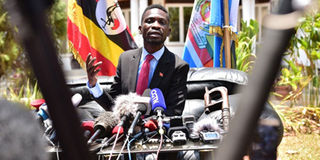A singer and a Big Man: An East African political story

Bobi Wine. Uganda’s President Yoweri Museveni is having that running-into-your-child-at-the-club moment as he faces off with the latest Ugandan political sensation, the youthful legislator Robert Kyagulanyi, more popularly known by his musician name Bobi Wine. PHOTO | ABUBAKER LUBOWA | DAILY MONITOR
What you need to know:
- The important person for the political story, therefore, is not Bobi Wine. It is Museveni.
- The more dry-eyed watchers of Ugandan politics say even after 32 years, Museveni is not about to say his farewells.
- Former Kenyan President Daniel arap Moi was the Museveni of today.
For parents who are “lifists”, and don’t know when to grow up and give up partying, they say there’s a rule of thumb: The day you run into your son or daughter in a club is the moment you should know that you have gone on for too long.
It’s time to stay at home and watch late night sports.
Uganda’s President Yoweri Museveni is having that running-into-your-child-at-the-club moment as he faces off with the latest Ugandan political sensation, the youthful legislator Robert Kyagulanyi, more popularly known by his musician name Bobi Wine.
BROKEN NOSE
Bobi Wine just returned home from the United States, where he had gone to mend a broken nose and other body parts after he was beaten down savagely by the presidential guard in the northwestern town of Arua early last month.
The music star clearly captured the Kenyan imagination, if media coverage of his trials and tribulations, and social media adulation, are anything to go by.
Why? one would ask.
It has only little to do with music, or youth. Yes, at 36, he is all of 38 years younger than veteran Museveni.
He was four, falling into the murky trenches of the slum where he grew up, when Museveni took over, and that gives him the street cred and fanatic urban support that is a headache to the President.
He is, indeed, younger than Museveni’s son, Maj-Gen Muhoozi Kainerugaba, 44, who was a long-time commander of his father’s guard, and in the past was whispered about as a successor in waiting.
NO FAREWELL
But the more dry-eyed watchers of Ugandan politics say even after 32 years, Museveni, who recently got the constitution amended to remove the 75-year upper age limit, is not about to say his farewells.
Perhaps as another proof of that, he put Muhoozi out to pasture last year, later appointing him one of his over 120 presidential advisers.
Activist and publisher John Githongo never tires of telling me that today’s Kenyans, even with their ethnic politics and nasty elections, are “fundamentally democratic”.
By which he means it’s very hard to win fairly, or steal, an election with over 60 per cent — let alone 90 per cent — of the vote, however much you try. Kenyans will contrive, fight, to ensure that the result is close, and the winner only gets his nose above 50 per cent.
DRAMATIC REPUDIATION
Kenyans, then, would, according to this Githongo view, be fascinated by Bobi Wine because he is a dramatic repudiation of a long-ruling strongman and, therefore, appeals to their “democratic character”.
However, we have to recognise that a fascination with the democratic almost often coexists with a deep curiosity about why the autocrat endures.
The arrival of Bobi Wine is, therefore, opportune because it comes at a time when Museveni has become something essential to Africa’s politics — the stereotypical Big Man, with awkward moments (spitting into a napkin on TV or peculiar fashion sense), violent moods and strange statements.
We should recognise this from the recent past: In the years immediately after Museveni came to power in 1986, in regional terms, he was the Bobi Wine.
MOI
Former Kenyan President Daniel arap Moi was the Museveni of today. Just read the newspapers of that period.
The important person for the political story, therefore, is not Bobi Wine. It is Museveni.
We are in uncharted territory in African politics as more veteran autocrats retire or are ousted. Last year, we witnessed the exit of Zimbabwe’s Robert Mugabe, at the ripe age of 93, and Angola’s Jose Eduardo dos Santos. Both were a few months shy of their 40th anniversary in power.
In 2011, veterans Hosni Mubarak in Egypt, after 30 years in power, and Libya’s Col Muammar Gaddafi, after 41 years, were shown the door.
For the first time since independence, we now have a whole region, southern Africa, without a long-ruling autocrat. Museveni is flying the banner for East Africa. Central Africa has a lone Sassou Nguesso, who’s been in power for a combined 35 years.
West Africa is doing a bit better, with Teodoro Obiang Nguema Mbasogo in Equatorial Guinea clocking a very respectable 40 years in State House soon, and Cameroon’s Paul Biya breathing down his neck with 36 years under his belt.
If you watch MotoGP (premier motorcye racing), Bobi Wine is like the precocious World Champion Marc Marquez.
But Marquez’s stardom assumes greater significance, because it raises the question about when the ageing multiple MotoGP World Champion Valentino Rossi, who is struggling painfully at the back, will throw in the towel.
Mr Onyango-Obbo is publisher of Africapedia.com and explainer Roguechiefs.com. Twitter@cobbo3





